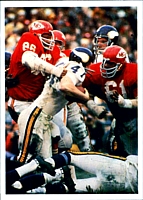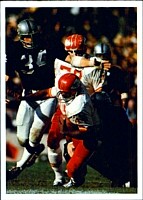Super Bowl IV
Super Bowl IV was an American football game played on January 11, 1970, at Tulane Stadium in New Orleans, Louisiana.
[1][2][8][9] Minnesota posted a 12–2 record in 1969, then defeated the Los Angeles Rams 23–20 for the Western Conference title,[10] and the Cleveland Browns 27–7 in the NFL Championship Game.
Under wet conditions, the Chiefs defense dominated Super Bowl IV by limiting the Minnesota offense to only 67 rushing yards, forcing three interceptions, and recovering two fumbles.
The NFL awarded Super Bowl IV to New Orleans on March 19, 1969, at the owners' meetings held in Palm Springs, California.
Healy and Miami mayor Stephen P. Clark became locked in a debate during a press conference while the deliberation and voting was going on behind closed doors.
Then in the following week, second string quarterback Jacky Lee went down for the season with a broken ankle in a loss to the Cincinnati Bengals.
However, Dawson silenced the critics and led Kansas City to a strong finish with two road wins in the playoffs, defeating the defending champion Jets 13–6, and the Raiders (who had beaten them 41–6 in the previous year's postseason and twice in the 1969 season) 17–7 in the AFL Championship Game.
Dawson's first chance to prove himself against an NFL team ended in failure, with his Chiefs losing 35–10 to the Green Bay Packers in Super Bowl I, reinforcing the notion that his success was only due to playing in the "inferior league".
Besides Dawson, the Chiefs main offensive weapon was running back Mike Garrett (1965 Heisman Trophy winner), who rushed for 732 yards and 6 touchdowns.
Six members of the Chiefs' defense have been inducted into the Hall of Fame: Culp, Buchanan, Lanier, Thomas, Bobby Bell, and Johnny Robinson.
First they defeated the New York Jets in a defensive struggle 13–6, with Dawson's 61-yard completion to Taylor setting up the game winning score on his 19-yard touchdown pass to Gloster Richardson.
Eller made a key play to preserve the lead, sacking Rams quarterback (and 1969 NFL MVP) Roman Gabriel in the end zone for a safety and Alan Page intercepted a pass with thirty seconds remaining.
Although Dawson was eventually cleared of any charges, the controversy added to the pressure he was already under while preparing for the game, causing him to lose sleep and concentration.
His counterpart, Hank Stram, wore a three-piece suit, with a red vest and a blazer with the Chiefs' helmet logo emblazoned on the breast pocket.
After the season, Summerall was transferred to work alongside Ray Scott, whose broadcast partner Paul Christman died on March 2, 1970.
The network and its French-language counterpart Télévision de Radio-Canada carried the broadcast, and it was saved because of Vikings coach Bud Grant's history in the CFL and the close proximity of Minnesota to Canada.
This was the first time that a head coach had worn a microphone during a Super Bowl, although Stram had done so during the regular season in a home game against the Boston Patriots.
Linebacker Willie Lanier commented that "Hank seemed somewhat more animated", quarterback Len Dawson "wondered why he was being so joyous and chattering all the time" and halfback Mike Garrett recalled that Stram "was in rare form and pretty glib".
Notable excerpts include the following: Chiefs head coach Hank Stram, who was also the team's offensive coordinator, devised an effective game plan against the Vikings.
[24] He knew Minnesota's secondary was able to play very far off receivers because Viking defensive ends Carl Eller and Jim Marshall knocked down short passes or put pressure on the quarterback.
[31][32] Included was a 20-yard reception by wide receiver Frank Pitts after Vikings cornerback Ed Sharockman gambled trying to make an interception.
On the first play of the Chiefs' ensuing drive, Dawson threw a 20-yard completion to Pitts, followed by a 9-yard pass to wide receiver Otis Taylor, to get to midfield before the end of the quarter.
However, on 3rd-and-4 at the 25-yard line, Vikings cornerback Earsell Mackbee broke up a deep pass intended for Taylor, forcing the Chiefs to settle for a 32-yard field goal by Stenerud, increasing their lead to 6–0.
On the second play of Minnesota's next drive, Chiefs cornerback Jim Marsalis forced a fumble on wide receiver John Henderson, who caught a 16-yard reception, and safety Johnny Robinson recovered the ball at the Vikings' 46-yard line.
A 19-yard run by Pitts on an end around play fooled the overaggressive, over-pursuing Viking defense to set up Stenerud's 25-yard field goal, increasing Kansas City's lead to 9–0.
On the ensuing kickoff, Vikings safety/kick returner Charlie West fumbled the ball, and Chiefs center Remi Prudhomme recovered it at the Minnesota 19-yard line.
The Vikings were demoralized after the game-breaking touchdown and the Chiefs' defense continued to shut them down in the fourth quarter, forcing three interceptions on three Minnesota possessions to clinch the 23–7 victory.
The defeat was total for the Vikings, as even Kapp had to be helped off the field in the fourth quarter after getting strip-sacked by Chiefs defensive end Aaron Brown.
Kansas City running back and future University of Southern California Athletic Director Mike Garrett, the 1965 Heisman Trophy recipient, was the top rusher of the game, recording 11 carries for 39 yards and a touchdown.
Kansas City is, as of 2023[update], the only team in the Super Bowl era to win the title without allowing as much as 10 points in any postseason game.



AFL championship game
